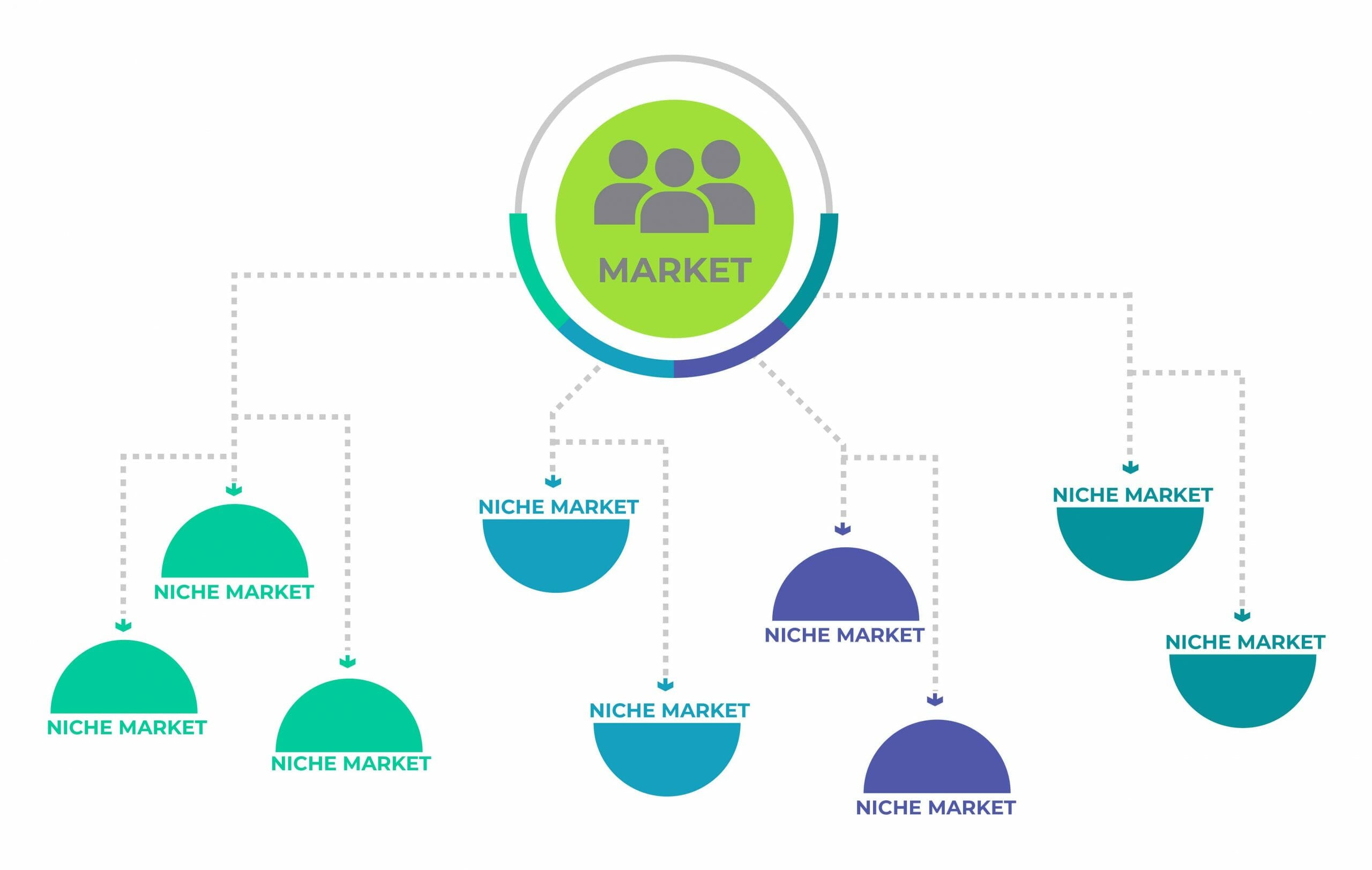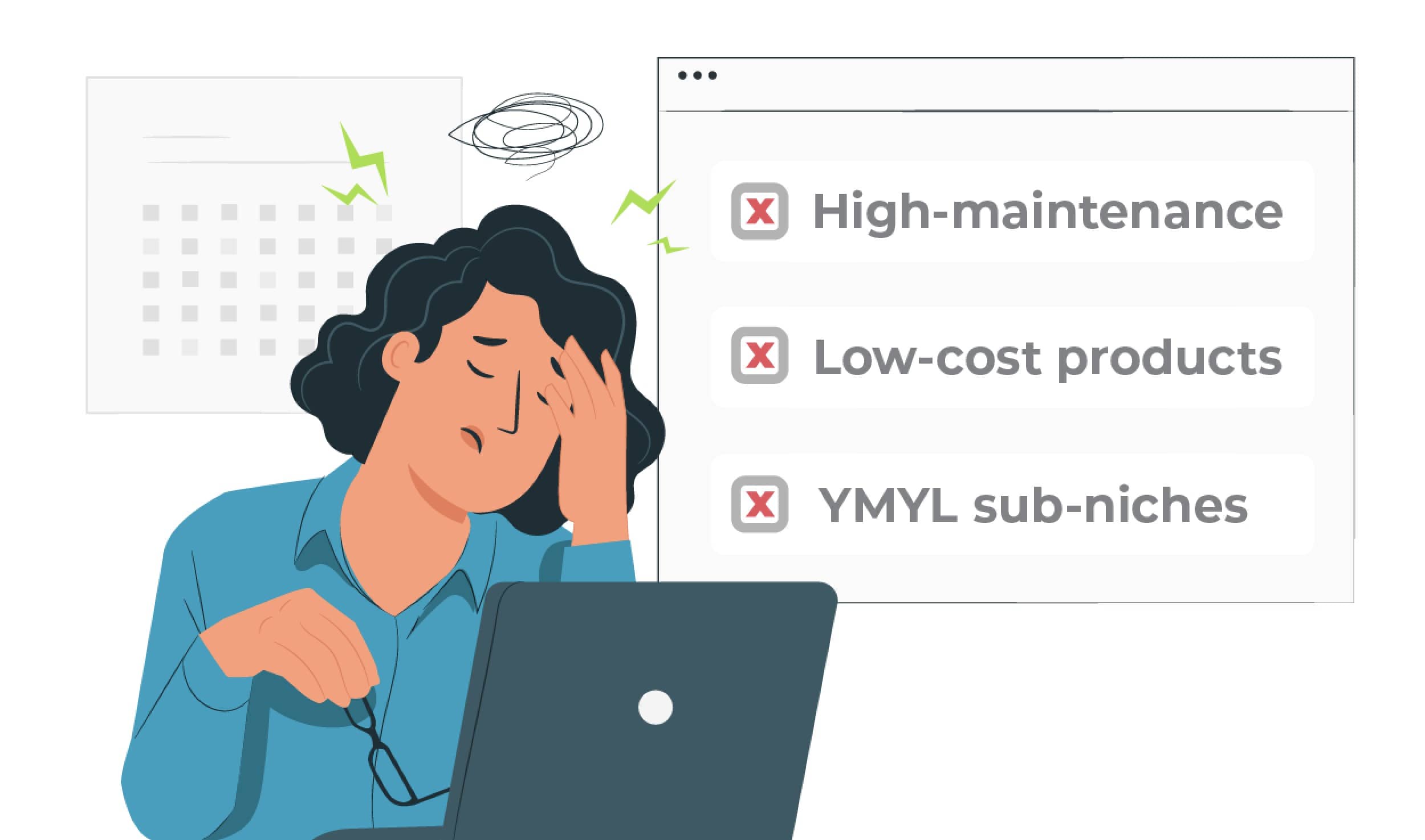Are you making the one big mistake that can stop you from getting rich in affiliate marketing? That mistake is being a “generalist.”
A generalist tries to sell products to a large audience in a broader market. When you cast a wide net, you make it harder to target your scattered audience with offers.
As an experienced affiliate marketing expert with a proven track record, I can assure you that the solution lies in niche marketing.
In this guide, you’re going to learn what that means and how to find a niche market/product you can serve. You’ll also learn the advantages and disadvantages of pursuing this type of marketing as your central strategy. It worked for me, so why wouldn’t it for you?
Table Of Contents
Niche Definition: What Is a Niche Market, Exactly?
A niche market is a market segment identified by a unique set of needs or preferences. These needs may follow from the purchaser’s budget, location, interests, attitude toward the product, or other factors.
Customers in these narrow niche markets typically have more brand loyalty to small businesses because they have unique needs that aren’t often served by the rest of the market. That can make them a more receptive target audience for your chosen niche product.
Niche markets are everywhere in online commerce. Nearly every larger market you can sell to has several niche products that appeal to a narrow, but enthusiastic, segment and takes less marketing effort on your end. Let’s dive deeper into some niche business examples.
Niche Market Examples
It’s not hard to recognize a potential niche market idea when you understand what you’re looking for. As an example, here is a list of markets (and some hugely profitable niche examples at that) that do a healthy amount of more focused business:
Nutrition
Muscle gain
Weight loss
Health and wellness
Large dogs
Large dog toys
Large dog nutrition
Small dogs
Cats
Birds
Organic pet food
Cameras
Mobile phones
Virtual reality
Gaming
Gaming components
Gaming services
All the examples in this list of niches are included because the product or service they involve meets a more specific need than the larger market.
That’s just the beginning. You could niche down even further. For example, you could focus on pet owners with specific breeds of dogs or types of health supplements, or you can check various niches withing gaming affiliate programs.
Bodybuilders are a very different target audience than weight watchers. Making either one of them your target market is going to require you to promote different products and approach your marketing differently.
These niche site ideas have made quite a few people rich, but they aren’t necessarily right for your online business. Let’s look at how you can find your niche market products.
How to Find Your Niche Market
Now that you know how to define a niche, it’s time to brainstorm some niche market ideas.
Finding the right niche market can be complicated. It’s personal and has a lot to do with your unique selling proposition. There is a right way to go about choosing your loyal customer base and niche product. I’ve laid out a process below that can speed it up.
I’ll start with four steps that can point you to your potential market and explain each one in more detail.
- Start with your interests
- Research the niche
- Research the customers
- Test, acclimate, and adjust
1. Start With Your Interests
Having an interest in your niche market is a natural advantage because enthusiasm is a powerful tool when you’re selling anything.
It motivates you to learn more and gives you a personal insight into what your readers want and which businesses they trust. That means it will be easier for you to answer questions like:
- What problem can I solve for my niche?
- What do I understand about this niche market that my competitors don’t?
- What need can I meet that other businesses can’t?
- Who is my ideal reader in this niche?
Trust me when I say:
2. Research the Niche
Researching a niche market means finding the right specific audience for your product or service. Start by looking at the current google trends in the market and identifying the needs of potential customers.
Where to Find One
Starting with your interests, you can begin researching niche markets and the businesses that sell in them. There are three primary sources that you can use to begin your search.
- Online marketplaces: Flippa, Empire Flippers, and other online website brokering businesses can offer you insight into which ones are worthwhile.
Check out the cost of various sites to determine what building in a niche market might be worth. You can also list out the most valuable sites so that you can research them later. The most valuable sites are the ones that are most worth reverse-engineering.
- Affiliate networks: Joining (or even just browsing) an affiliate network will help you understand what has the most in-demand products. A lot of offers with generous commissions means you’re on the right track.
- Local affiliates: Consider taking a high-competition niche market and localizing it to create some room for yourself.
Once you’ve determined what’s viable, you should consider what to look for in a niche, and what you should avoid.
What to Look for in a Niche:
Profitability: Look for excellent affiliate commission potential. You should be able to find product or service offers with either high commissions (10-30% per sale), or recurring arrangements that let you collect on your sales for years.
Rankability: How well can you rank a website in the niche? To find out, examine keywords in the niche. If the keywords are high competition, you know that it will be a pain. Focus on ones with low and medium competition keywords, particularly at the start.
“Oh Shit” Urgency: A niche that meet an urgent need are great. These have a high impact on people’s lives—the things that make them say, “oh shit, I need to make a change.” Weight-loss, dating, and certain non-life-threatening medical issues (like snoring) are excellent examples.
What to Avoid in a Niche:
Particular niches are more difficult for a variety of reasons. You should try to avoid the ones that are:
High-maintenance: Avoid any niche that may change rapidly due to technology, fads, or other issues. If you need to update your website frequently to catch up, that’s lost time you could be using to build something more significant.
Low-cost products: Cheaper products are often developed with meager margins. They’re rarely lucrative for anyone except those who have massive networks to move products at scale.
YMYL sub-niches: Your-Money-Your-Life is a subset of “oh shit” niche market examples that involve financial advice or acute (for example, pain control) medical treatment. Google audits these niches with live searchers, and they aren’t the only ones. Regulators and industry associations also take an interest in these niches, and violating rules could open you up to legal problems.
3. Research the Customers
You’ll have found some strong mass markets at this stage with potential. Now, you need to understand the customers’ motivations in that market.
The keyword research you did while estimating rankability will also be helpful here. Still, there are some actions you can take beyond keyword research to find out what a particular niche market customer is like and what they want.
Research what works for your competitors: Track down the niche’s biggest sites and look at what they have in common. This will help you determine a solid niche-marketing strategy by taking inventory of what marketing efforts are working already.
Go to their communities: Take advantage of forums, Facebook pages, subreddits, and other online hangouts to learn about your customers. Take note of the features that excite them the most. Examine what benefits the top features offer to the niche market, and list the terms they use to describe those features.
Do personal interviews: Try to find and speak to an example of your ideal customer. Have a long conversation, and ask them any remaining questions you have about what motivates them to buy.
4. Test, Acclimate and Adjust
Even if you’ve done everything else right, testing is a necessity. You won’t know if you understand or enjoy a niche market until you’ve spent some time in it.
Keep track of the amount of time you’re using to get started and the sales that you’re making and the rate conversions happen..
If you aren’t accomplishing as much as you’d like, there are some steps you can take to adjust things without giving up all the work that you’ve already put in.
Narrow the niche target market down even further: Success may be a matter of targeting an even smaller niche. If a certain kind of topic is driving all of your conversions, consider dedicating your site to that topic alone.
Focus on your best traffic source: If one source (such as a specific social media site or SEO) accounts for most of your traffic, double-down on serving that traffic, and invest in improving that source.
Improve your conversions: You can do well with a small amount of traffic if potential customers convert more reliably. If you’re still committed to a niche without a lot of traffic, clear the page of distracting elements and optimize your conversion rate.
What Is Niche Marketing?
Niche marketing (“nicheing” to some) is the name given to the marketing strategy of focusing on a very specific market niche. Is it worth it? That’s not an easy question to answer. You should consider the advantages and disadvantages.
Less competition: You can avoid competing with retailer brands in huge markets by avoiding the mass market and focusing on only a narrow segment. Their advertising won’t target your conscious consumers directly.
Sharper insights: Focusing on a narrow segment will give you more insight into that segment’s precise needs. This can allow you to become and position yourself as a specialist to certain brands.
Launchpad into other niche markets: Gaining credibility in one niche market can easily launch into another market niche. For example, if you rock the pet food niche, you can quickly build, network, and promote sites that focus on pet accessories, toys or training classes.
Smaller markets: By definition, niche serves a small segment of one market. The segment gets smaller and smaller as you refine your market. Make sure you allow yourself room to grow and take on other segments of the broader market once you’ve dominated your niche.
More industry research: The more specialized your business idea, the more in-depth your research needs to be. If you don’t have some knowledge of your niche ideas, then it’s going to be hard to write about the subject and build brand loyalty.
Vulnerable to market changes: Sudden changes in the market can sink a niche overnight. Remember fidget spinners? MoviePass? Many small business owners built affiliate sites named for these products, and now they barely have a market at all.
Limited scope for scaling: While niche markets offer less competition, they also have a smaller customer base. This means that even if you achieve total dominance in your market, the scope for scaling may be restricted.
Personalization can be demanding: Because niche marketing involves serving a distinct and specialized audience, it requires a deep understanding of customer wants and needs. Crafting tailor-made messages and products can be time-consuming and resource-intensive.
Difficult to stand out: While competition is less fierce in niche markets, it can be more difficult to differentiate your brand from others. This can be especially challenging if the niche is popular and has several strong players.
Niche marketing can be a very effective way to reach a highly targeted audience. It can be particularly beneficial for small businesses with limited resources, allowing them to compete against larger businesses by providing unique products or services to a specific group. However, it requires significant market research, an understanding of the target customer, and continual adaptability to market changes.
While there are potential disadvantages, such as smaller market size and vulnerability to market fluctuations, many of these can be mitigated with careful planning and an adaptable business model. Ultimately, the success of a niche marketing strategy will depend on how well it aligns with your business’s capabilities, resources, and goals. It’s not a one-size-fits-all approach, but for some businesses, it can be a game changer.
Find Your Way to Your Niche Audience
Now, you’ve learned what a niche market is and how to identify one across different affiliate networks.
That should be all you need to find your niche market and start reaching out to businesses with offers. You can use this knowledge to target a unique market segment with content marketing, affiliate marketing, social media platforms
or whatever digital marketing strategy you prefer.
Armed with the knowledge of what to look for and what to avoid, you can find a product that’s a perfect match for you. Just make sure you consider the advantages and the disadvantages before you decide to pursue niche-marketing.
If you need a little help learning the ropes, you can join The Affiliate Lab. Here, you can learn from a library of elite guides, and hang out in a community with some of the best affiliates online.




 What problem can I solve for my niche?
What problem can I solve for my niche?



